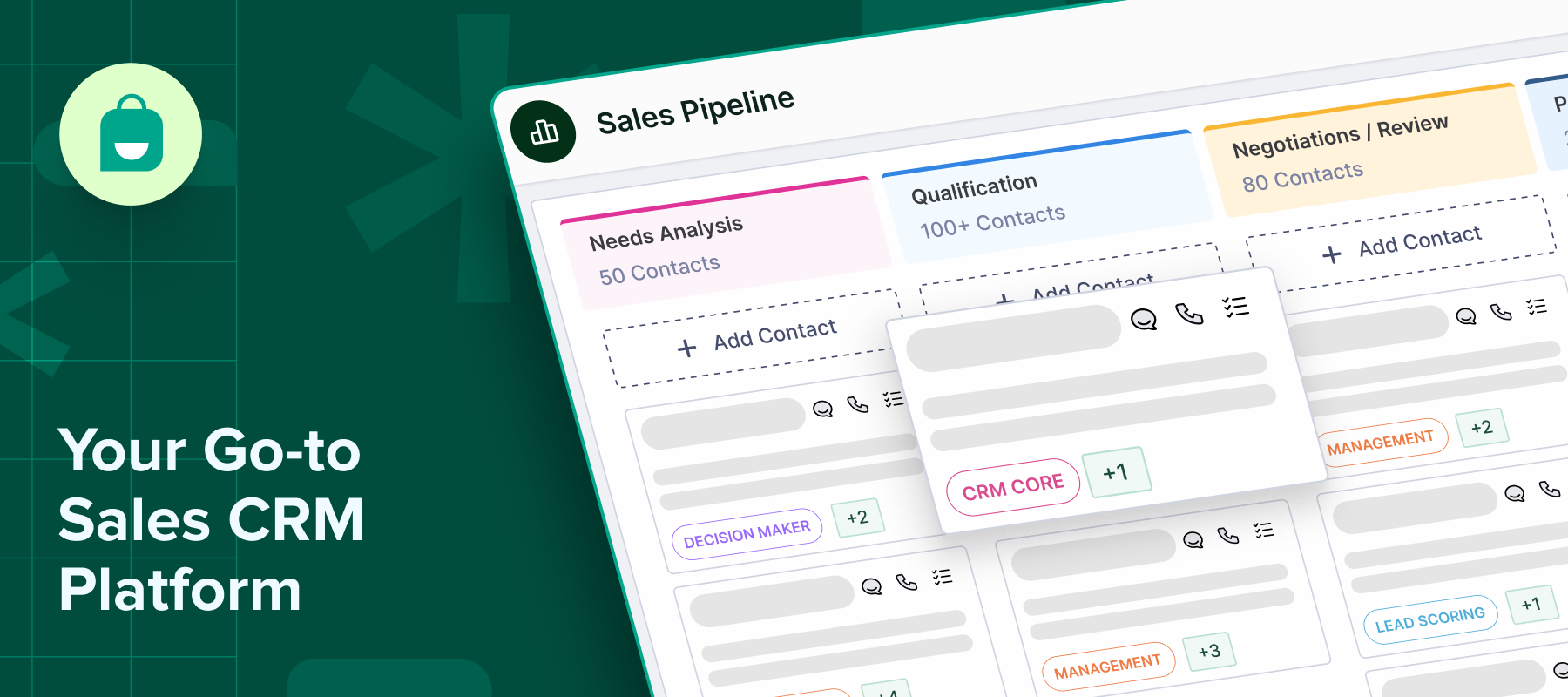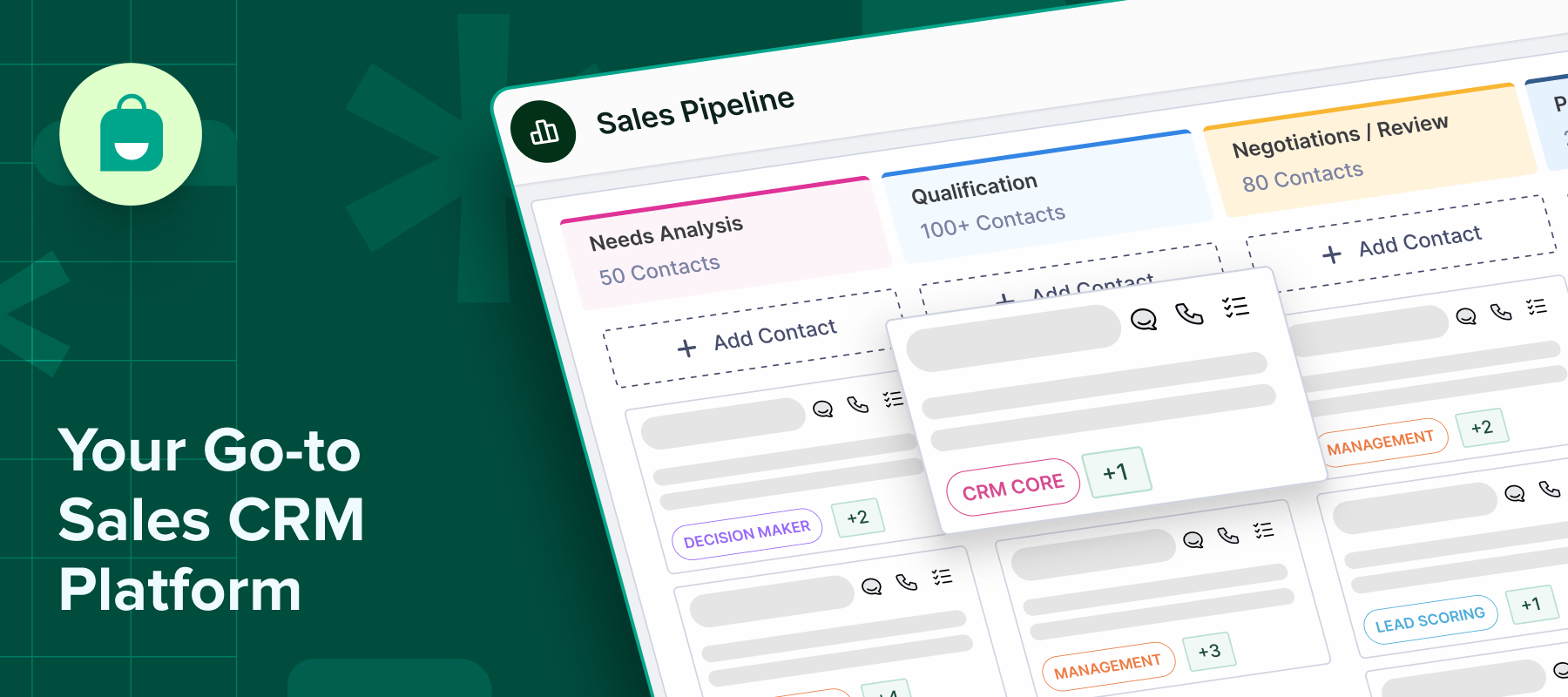Enterprise businesses operate on a large scale, with multiple departments handling various functions. Every team, whether it’s sales, marketing, customer support, or operations, deals with a massive flow of information every day.
This volume of data is what brings complexity. It’s difficult to manage, and even a small error or missed input can disrupt day-to-day operations and decision-making.
That’s why having a CRM is essential, especially for sales. It brings all your data into one place, helps teams stay aligned, and ensures every interaction is tracked and managed efficiently.
In this guide, we’ll explore the top Sales CRM solutions built for enterprise needs in 2025, so you can focus on driving results instead of chasing down scattered data.
What Defines an Enterprise-Grade CRM?
A Sales CRM is a software platform that helps sales teams manage leads, track customer interactions, automate follow-ups, and move deals through the pipeline efficiently. In enterprise settings, a CRM needs to do all this at scale, across multiple teams, regions, and product lines, while keeping data organized and accessible.
Here’s what separates an enterprise-grade CRM from the rest:
-Scalability and performance under load: It should support thousands of users and millions of records, without system slowdowns, even during peak usage or large data operations.
-Customization and workflow automation: Allows deep customization of sales processes, roles, and workflows across departments, so each team can operate the way they need to.
-Advanced reporting and analytics: Real-time dashboards and deep analytics should be built in, offering flexible views into sales trends, deal progress, team performance, and revenue forecasts.
-Security and compliance: Meets strict security standards like GDPR, HIPAA, and SOC2 to protect enterprise data and ensure regulatory compliance.
-Dedicated support and onboarding: Comes with priority SLAs, hands-on onboarding, dedicated account managers, and technical specialists to support implementation and growth.
Benefits of Using Top Sales CRM for Enterprise Operations
Here are some benefits of using a top sales CRM for enterprise operations:
Unified view of customer and account data
A Sales CRM brings all customer and account information into one place. This allows different teams like sales, marketing, and support to access the same data, avoid duplication, and work with better coordination.
Improved sales productivity and pipeline visibility
CRMs help sales teams track deals in real time, see where each opportunity stands, and focus on what matters most. This improves forecasting accuracy and helps managers spot risks or gaps in the pipeline early.
Seamless integrations with ERP, marketing, and support tools
A good CRM connects easily with tools used by other departments, such as ERP systems, marketing automation platforms, and support software. This keeps the entire tech stack connected and avoids manual data entry or sync issues.
AI-driven insights and sales automation
CRM platforms with AI features can analyze past sales data to identify patterns, suggest next steps, and evaluate deal scores. Automation features reduce time spent on repetitive tasks like follow-ups or data updates, allowing teams to focus more on selling.
Global accessibility and team coordination
Cloud-based CRMs give teams access to the same data from anywhere. This is useful for global or remote teams that need real-time visibility into accounts, tasks, and pipeline activity across different regions.
Top Sales CRM for Enterprise in 2025: Ranked List & Reviews
Here are some of the best sales CRM for enterprises in 2025:
1. Interakt
Interakt is a sales CRM designed specifically for businesses that sell through WhatsApp and Instagram. It helps teams capture leads, instantly qualify them, and close deals directly within messaging apps. With automation, AI-driven insights, and quick setup, it’s ideal for fast-paced, high-volume conversational sales environments.
Key Features:
–Lead capture from WhatsApp, Instagram, and APIs
–Automated lead qualification via WhatsApp workflows
–Visual sales pipeline with role-based access
–Broadcast –personalized messages at scale
–Built-in payment reminders and catalog sharing
–Real-time agent tracking and performance monitoring
–AI-powered follow-ups and lead scoring
–60+ plug-and-play integrations, including payment gateways
Pricing:
₹2,499/month
Pros:
–Strong native support for WhatsApp and Instagram
–Fast to set up and easy to use
–Designed for high-speed lead engagement and follow-ups
–Affordable pricing for small to mid-sized teams
–Real-time agent accountability and performance tracking
Cons:
–Limited to WhatsApp and Instagram workflows
–May require additional tools for non-conversational sales workflows
2. HubSpot CRM
HubSpot CRM offers a clean, user-friendly interface with tools for sales, marketing, and support teams. Its free version is generous, while the Smart CRM upgrade adds enterprise-level features like advanced automation, reporting, and team management.
Key Features:
–Visual sales pipeline with real-time tracking
–Custom dashboards and performance reporting
–AI-powered email writing and automation tools
–Integration with marketing, service, and operations hubs
–Up to 1,000 contacts on the free plan with unlimited users
–Scalable to enterprise-grade features with Smart CRM
Pricing:
Paid plans start at $20 to $1,200+ per user/month
Pros:
-Free plan with solid core features
-Easy to set up and user-friendly interface
-Strong integration across marketing, sales, and service
-Scales well with growing teams
Cons:
-Advanced features require higher-tier plans
-Customization options are limited in the free version
-Expensive as you scale into enterprise plans
3. Pipedrive CRM
Pipedrive is a sales-focused CRM built to help teams manage leads, track communication, and close deals faster. Its visual pipeline and simple interface make it ideal for businesses looking for an easy-to-use CRM with strong automation and tracking, without unnecessary complexity.
Key Features:
-Visual sales pipeline with drag-and-drop functionality
-Customizable pipelines and stages
-Workflow automation for repetitive tasks
-Real-time sales reporting and forecasting
-Email integration with tracking and templates
-400+ integrations including Google Workspace, Slack, and Trello
Pricing:
Starts at $14 to $99 per user/month
Pros:
-Clean and intuitive interface
-Strong focus on sales and pipeline management
-Quick to set up and easy to adopt
-Affordable for small to mid-sized teams
Cons:
-Marketing and service features are limited
-Lacks advanced territory or role-based access controls
-Custom reporting is limited in lower-tier plans
-Not ideal for highly complex or multi-layered sales processes
4. Close CRM
Close CRM is designed for fast-paced sales teams, especially small businesses and startups. It combines calling, emailing, SMS, and pipeline tracking in one simple interface. The platform emphasizes speed, ease of use, and automation to reduce admin work and help reps focus on closing deals.
Key Features:
-Built-in calling, email, and SMS tools
-Custom workflows and sales automation
-Visual pipeline and activity tracking
-Bulk email sending and follow-up scheduling
-Task management and reminders
-Seamless integrations with tools like Zoom, Google Calendar, and Zapier
-Easy migration and free support
Pricing:
Starts at $49 to $139 per user/month. A Custom plan is also available.
Pros:
-Fast and clutter-free interface
-All-in-one communication and pipeline management
-Easy to set up and use for small teams
-Great support and regular product updates
Cons:
-Limited marketing features
-May not scale well for complex enterprise use cases
-Reporting capabilities are basic in lower plans
5. Salesforce CRM
Salesforce is an enterprise-grade CRM built for large teams managing complex sales and service workflows. It supports sales, marketing, and support functions in one platform. With Einstein 1, it adds AI, automation, and deep customization on a large scale.
Key Features:
-Sales, marketing, service, and commerce modules
-Einstein AI for predictive insights and automation
-Visual dashboards and real-time reporting
-Extensive app ecosystem with 8,700+ integrations
-Scalable cloud infrastructure with Hyperforce
-Enterprise-grade security and compliance controls
Pricing:
Starts from $25 to $500 per user/month
Pros:
-Full-featured CRM for large and complex teams
-Strong AI, automation, and analytics capabilities
-Highly customizable with broad integration support
-Scales well across global teams and functions
Cons:
-Steeper learning curve for new users
-Higher pricing for full enterprise functionality
-Setup and customization can require expert support
-Overkill for smaller or simpler sales teams
Comparison Table: Features, Pricing, Integrations & More
To help you evaluate the right fit for your business, here’s a side-by-side comparison of the top Sales CRMs based on enterprise pricing, scalability, AI capabilities, and integration support:
| Feature | Interakt | HubSpot CRM | Pipedrive | Close CRM | Salesforce |
|---|---|---|---|---|---|
| Enterprise Pricing | ₹2,499/month (5 agents included) | $1,200/month (Enterprise Sales Hub) | $99/user/month (Enterprise plan) | $139/user/month (Business/Enterprise plan) | $165–$500/user/month (Enterprise to Einstein 1) |
| Scalability | Scales efficiently from small teams to growing enterprises | Scales well from startups to enterprise | Good for SMBs; limited for large setups | Ideal for small, agile teams | Built for large, global, multi-team orgs |
| AI Features | Basic AI-led chat and follow-ups | AI email writer, task automation | AI assistant, smart suggestions | AI lead summaries, call coaching | Einstein AI: automation, predictions, insights |
| Integrations | 60+ (Google Sheets, Razorpay, Shopify, etc.) | 1,700+ (Slack, Gmail, Zapier, more) | 300+ (Google Workspace, Trello, Slack) | 100+ direct + thousands via Zapier | 8,700+ via AppExchange (Slack, MuleSoft, etc.) |
How to Choose the Right CRM for Your Enterprise Needs
Here’s how you can choose the right CRM according to your enterprise needs:
1. Industry-specific needs
Different industries require different workflows, compliance, and data handling. Choose a CRM that aligns with your sector’s specific demands.
For example:
-Finance: Choose a CRM that offers built-in compliance features like audit trails, secure data handling, approval workflows, and document tracking.
-SaaS: Look for flexible pipelines, support for recurring revenue and renewals, along with integrations for billing, customer support, and product analytics.
-Healthcare: Prioritize CRMs that meet healthcare regulations such as HIPAA, and offer secure communication, patient record management, and consent tracking.
2. Team size and global operations
Enterprises with distributed teams need CRMs that can scale across geographies while maintaining clarity and control.
As your team grows across regions, here’s what your CRM should support:
-Multi-location support: Provides centralized visibility and management while enabling location-specific data views and settings.
-Multi-language support: A user interface and communication tools that adapt to different languages for global teams.
-Region-based role access: Allows admin control over what users in different locations or departments can see and do, helping maintain security and clarity at scale.
3. Customization and security features
The right CRM should give your teams the flexibility to work efficiently, without compromising on security.
Here’s what to look for:
-Role-based access: Controls who can access, edit, or manage specific data or modules based on their role, ensuring secure and structured user access across teams.
-Encryption: Protects sensitive customer and business data both at rest and in transit, helping you meet compliance standards and prevent breaches.
-Audit logs: Tracks user actions within the system, offering visibility for internal reviews and supporting regulatory compliance.
-Sandboxing: Allows teams to test new workflows, settings, or customizations in a risk-free environment before applying changes to live data.
Conclusion
Enterprise businesses need CRM solutions that can quickly adapt to changing needs, evolving team structures, and rising customer expectations.
Interakt is built for that kind of flexibility, with fast setup, messaging-first workflows, and features designed for speed and simplicity.


